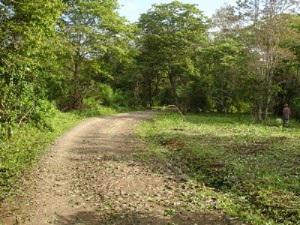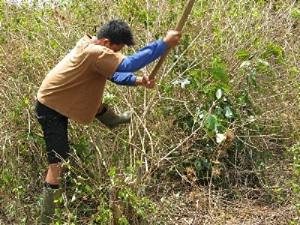Imanuddin
West Bali National Park, located in the western part of Bali is the last stronghold for Balinese biodiversity. This lowland forest is home for endemic and critically endangered Bali Starling Leucopsar rothschildi. Despite of its important status, the West Bali National Park has suffered serious problem from invasion of exotic weed Lantana camara, Jatropha gossypifolia and Acacia nilotica which caused decreasing grazing area, inhibiting forest regeneration and inducing forest fire during long dry season.
The aims of the project are:
(1) to control and reduce distribution of invasive weed and enlarge grazing area
(2) to improve forest regeneration through planting native tree.

After uprooting.
West Bali National Park is located on the west side of Bali Island and home for Bali Starling, an endemic and critically endangered bird dwelled in lowland forest of Bali. Though this forest is believed as the last stronghold for Balinese biodiversity, in reality the quality of the forest habitat has been degraded. Invasive weed (Lantana camara and Acacia nilotica) has been reduced grazing are for wildlife and inhibit forest regeneration. Besides, the presence of invasive weed produces flammable material that induces forest fire every year during long dry season which occur for 8 months.

Uprooting lantana.
The major activities in this project including:
1. Eradicating invasive weed from tropical deciduous forest of West Bali national Park.
Invasive weed has been identified as one of biodiversity threat in several areas in the world. The similar problem also occurs in the west Bali national park. Almost the area of the deciduous forest has been invaded by invasive weed which caused decreasing size of grazing area, inhibits forest regeneration and provides a flammable material during long dry season. We plan uproot this invasive species and replace with native tree. Through eradicating invasive weed we expect to enlarge grazing area and boost forest regeneration.
2. Planting and caring native tree that current population already decline
Native trees is an important part for daily live of Balinese, they use many native trees for carving and part of religious ceremony. Due to this massive exploitation, currently population of native trees have been declined. Although West Bali national park is the last stronghold for biodiversity, lack of forest ranger and the presence invasive weed makes this forest also suffer heavy exploitation in the past. We expect from planting native trees (sandal wood, wild sapodilla tree, crocodile wood, golden shower tree, white bark acacia) we would recover their population.